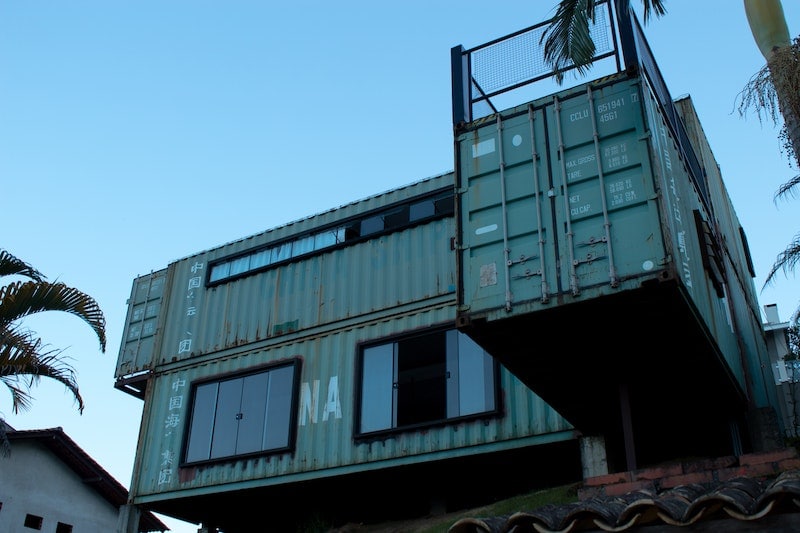Are Shipping Container Homes Legal in New York? What to Know
-
Kristin Hitchcock
- Last updated:

New York has no regulations preventing you from building a structure out of containers. Therefore, these homes are currently legal in the state. Several have already been built, and more are being built all the time. Therefore, you should be able to build these homes in this state without much of a problem.
However, you may have to tip-toe through specific regulations by adding certain additions to your home or building it slightly differently than you might otherwise. You still have to make your container home comply with housing standards—even if no standards discuss container homes specifically.
 Housing Regulations and Container Homes
Housing Regulations and Container Homes
As we’ve stated, all New York homes must adhere to specific standards, including shipping container homes. In New York, everything is based on ICC building codes. Many container homes have been built under these guidelines, so it isn’t impossible. However, you should keep these regulations in mind when building your home.
For instance, New York does have zoning laws. Therefore, residential structures can only be built in certain areas. Of course, container homes also have to adhere to these regulations. While property can be rezoned sometimes, it’s a long process that may require the buy-in of neighbors.
Building codes also exist. These codes are made to ensure that homes are safe and habitable. They prevent contractors from potentially cutting corners or unsafe buildings being erected just because they are cheaper. However, they also affect container homes and all container homes will have to follow these regulations.
These codes are updated every year or two as safer, better ways of building are developed. New building materials and styles gain popularity, so the code must be continuously updated to consider these.
Building codes are controlled at the very local level. You’ll need to work with the city office if you live within city limits. If you live outside city limits, you’ll likely need to deal with the county government. Remember, most people want to help you. Therefore, if in doubt, we recommend calling the office or even going there in person to ask your questions.
Before starting your home, you’ll need to apply for permits. These permits require that you prove (through building plans and other paperwork) that the home will meet all the regulations and requirements. Often, your local office will work with you on adjusting the plan as necessary. You may not need to change the actual build in all cases but simply add some extra information.
You may have to pay fees and stop work if you don’t get these permits. Sometimes, the building may need to be torn down and started over. Therefore, ensure that you carefully consider the regulations and follow the application process before you begin.

Common Regulations
Because regulations are done at the city and county levels, it’s impossible to tell you exactly what regulations you’ll need to follow.
- Appearance: What the building looks like and the materials that are used on the outside of the house.
- Size: How big a building must be to be considered a home.
- Foundation: The types of foundations needed, their size, and material requirements.
- Emergency Exits: How far you have to travel before meeting an exterior door, the size of internal halls, exterior exit sizes, etc.
- Electrical and Mechanical: How these systems must be installed and what materials they can use (or not use).
- Structure: How stable the building is, including snow and wind loads.
- Accessibility: Any requirements to make your home more accessible to those with disabilities.
- Site Offsets: How close the building can be to the property line, road, or another structure.
- Landscaping: What plants and trees you can have around your home (including their distance from your house).
- Fire Protection: Smoke detector regulations, including the number and type required.
- Energy Conservation: Insulation, sealing, appliances, windows, and other regulations affecting energy usage.
When a container home is denied for a permit, it usually isn’t just because it is a “container home.” Instead, it is likely because of one of the above reasons. It’s important to familiarize yourself with the local laws and regulations to figure out exactly what features your container home needs.
How Much Does It Cost to Build a Container Home in New York?
Building a container home has several benefits, but the biggest one is the cost. These homes cost far less than others out there. The exact price will depend on the container you use and what you outfit it with. However, you’re often looking at around $100,000 once everything is said and done.
If you need multiple containers, your price will go up. Exterior finishings will also raise the price, though many people paint the metal siding of the container (if regulations allow it). Either way, you can keep prices down by choosing cheaper finishings. However, don’t go so cheap that you diminish the home’s durability or energy efficiency, as these will cost you in the long run.
 Conclusion
Conclusion
You’ll need to follow your local regulations when building a container home in New York. Very few counties completely ban container homes. However, you may have to change the exterior walls (by adding siding, for instance) or the structure. Local regulations often allow container homes to be built, and you need to consider these regulations when planning.
You can build the home yourself after seeking the right permits or hiring someone to build it. You’ll usually not have to purchase permits if you do the latter option.
See Also:
Featured Image Credit: Tillo2015, Shutterstock
Contents
 Housing Regulations and Container Homes
Housing Regulations and Container Homes